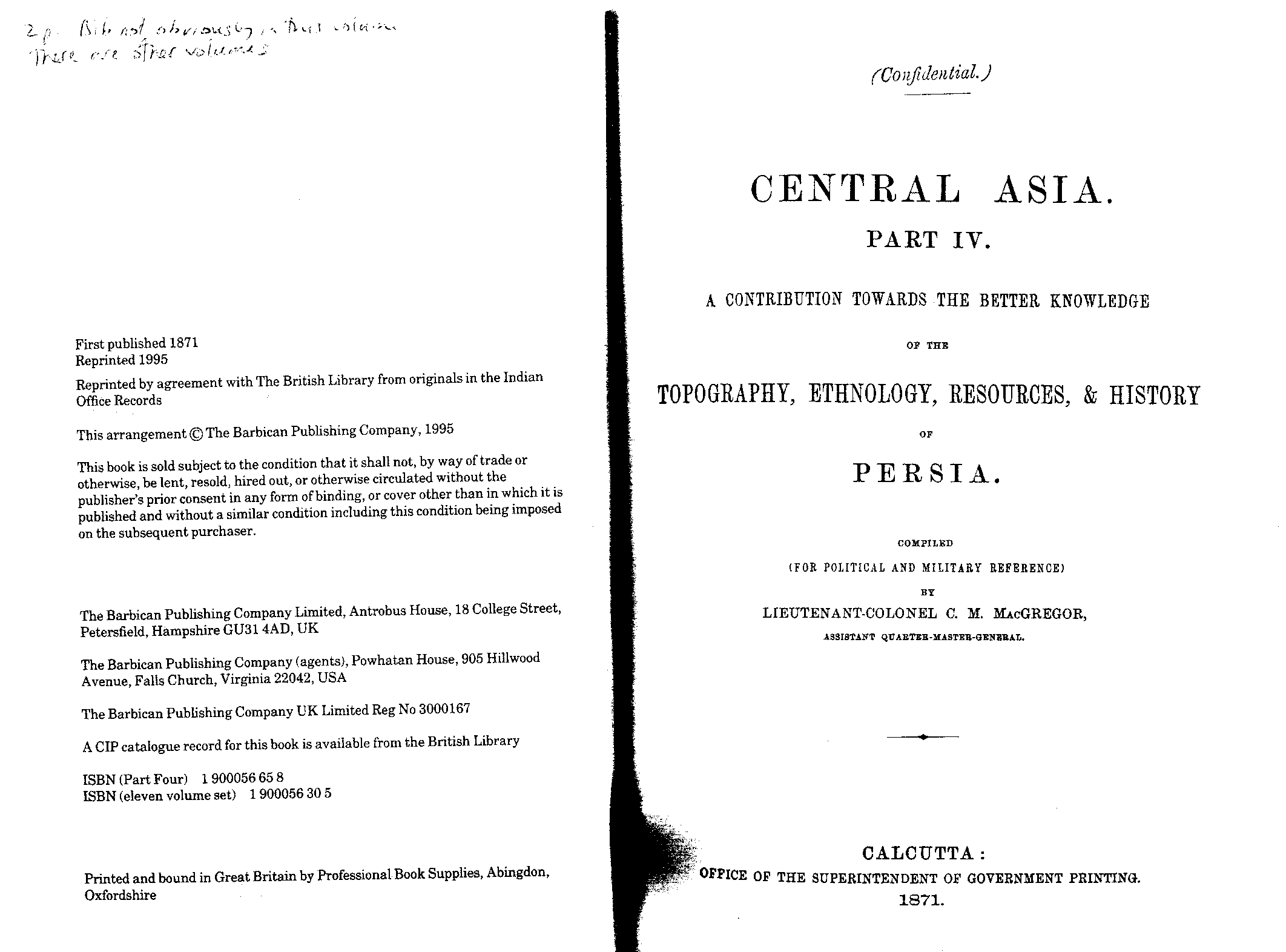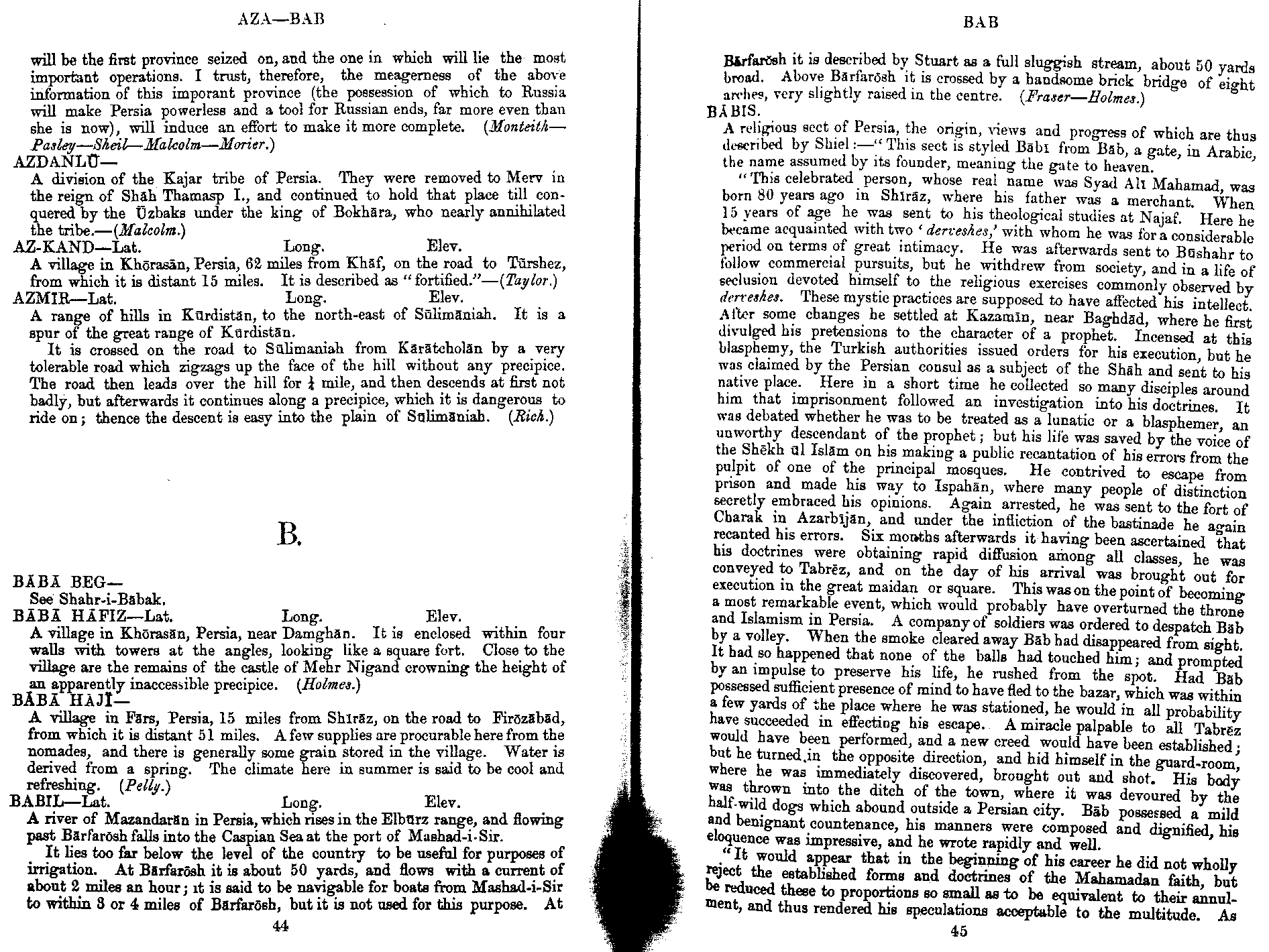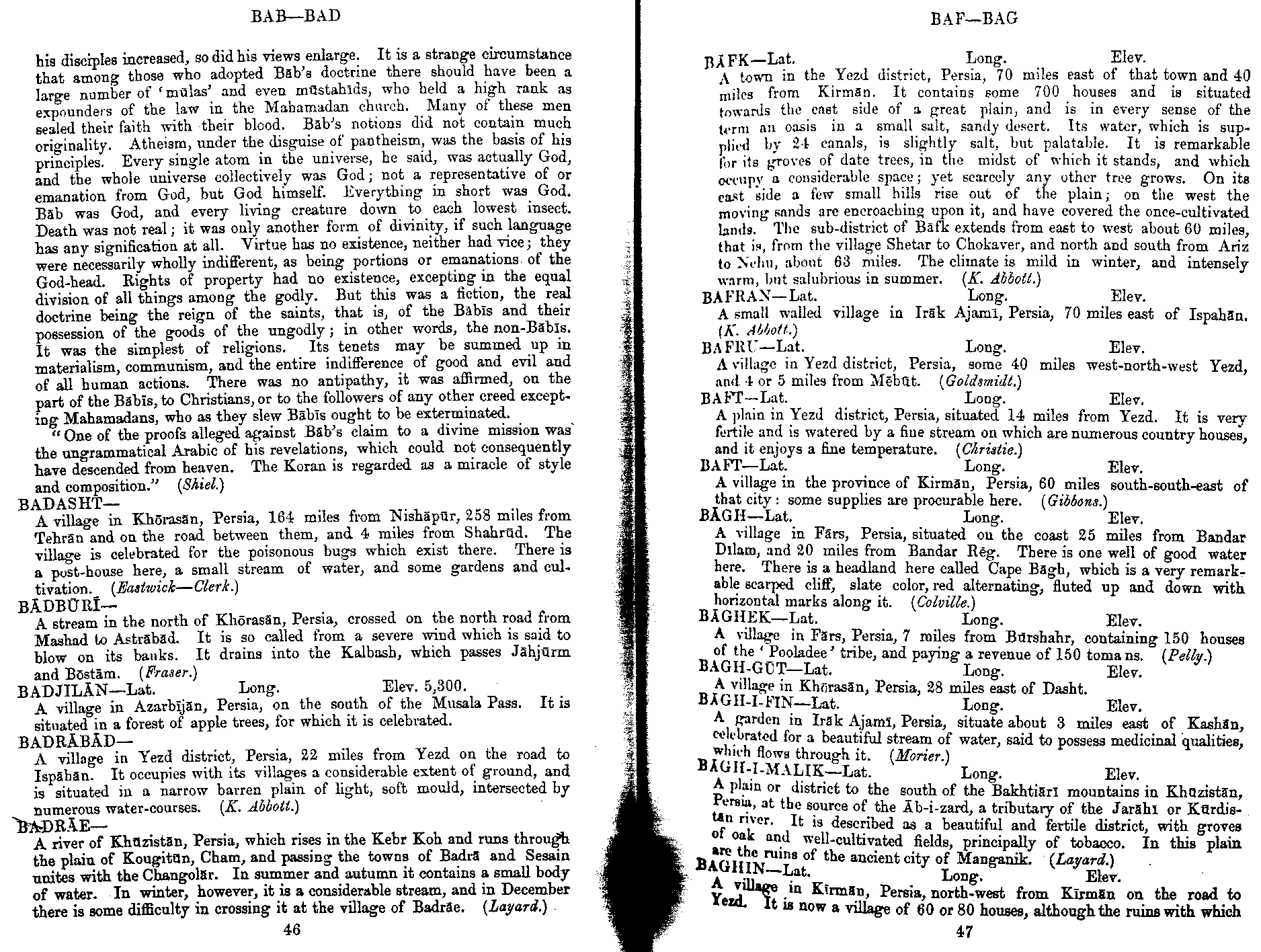
|
|
Abstract: Short overview, as excerpted by MacGregor from Shiel's Glimpses of Life and Manners. |
Bábís
by C. M. MacGregor
published in Central Asia Part IV: Topography, Ethnography, and History of Persia, pages 45-46Hampshire, UK: Barbican Publishing Company, 1995-12
date of original: 1871
1. Text
A religious sect of Persia, the origin, views and progress of which are thus described by Shiel [online at bahai-library.com/shiel_glimpses_life_persia]: —"This sect is styled Bābi from Bāb, a gate, in Arabic, the name assumed by its founder, meaning the gate to heaven.(Shiel.)"This celebrated person, whose real name was Syad Alī Mahamad, was born 80 years ago in Shīrāz, where his father was a merchant. When 15 years of age he was sent to his theological studies at Najaf. Here he became acquainted with two ‘derveshes’ with whom he was for a considerable period on terms of great intimacy. He was afterwards sent to Būshahr to follow commercial pursuits, but he withdrew from society, and in a life of seclusion devoted himself to the religious exercises commonly observed by derveshes. These mystic practices are supposed to have affected his intellect. After some changes he settled at Kazamīn, near Baghdād, where he first divulged his pretensions to the character of a prophet. Incensed at this blasphemy, the Turkish authorities issued orders for his execution, but he was claimed by the Persian consul as a subject of the Shāh and sent to his native place. Here in a short time he collected so many disciples around him that imprisonment followed an investigation into his doctrines. It was debated whether he was to be treated as a lunatic or a blasphemer, an unworthy descendant of the prophet; but his life was saved by the voice of the Shēkh ūl Islām on his making a public recantation of his errors from the pulpit of one of the principal mosques. He contrived to escape from prison and made his way to Ispahān, where many people of distinction secretly embraced his opinions. Again arrested, he was sent to the fort of Charak in Azarbījān, and under the infliction of the bastinade he again recanted his errors. Six months afterwards it having been ascertained that his doctrines were obtaining rapid diffusion among all classes, he was conveyed to Tabrēz, and on the day of his arrival was brought out for execution in the great maidan or square. This was on the point of becoming a most remarkable event, which would probably have overturned the throne and Islamism in Persia. A company of soldiers was ordered to despatch Bāb by a volley. When the smoke cleared away Bāb had disappeared from sight. It had so happened that none of the balls had touched him; and prompted by an impulse to preserve his life, he rushed from the spot. Had Bāb possessed sufficient presence of mind to have fled to the bazar, which was within a few yards of the place where he was stationed, he would in all probability have succeeded in effecting his escape. A miracle palpable to all Tabrēz would have been performed, and a new creed would have been established; but he turned in the opposite direction, and hid himself in the guard-room, where he was immediately discovered, brought out and shot. His body was thrown into the ditch of the town, where it was devoured by the half-wild dogs which abound outside a Persian city. Bāb possessed a mild and benignant countenance, his manners were composed and dignified, his eloquence was impressive, and he wrote rapidly and well.
"It would appear that in the beginning of his career he did not wholly reject the established forms and doctrines of the Mahamadan faith, but he reduced these to proportions so small as to be equivalent to their annulment, and thus rendered his speculations acceptable to the multitude. As his disciples increased, so did his views enlarge. It is a strange circumstance that among those who adopted Bāb's doctrine there should have been a large number of ‘mūlas’ and even mūstahīds, who held a high rank as expounders of the law in the Mahamadan church. Many of these men sealed their faith with their blood. Bāb's notions did not contain much originality. Atheism, under the disguise of pantheism, was the basis of his principles. Every single atom in the universe, he said, was actually God, and the whole universe collectively was God; not a representative of or emanation from God, but God himself. Everything in short was God. Bāb was God, and every living creature down to each lowest insect. Death was not real; it was only another form of divinity, if such language has any signification at all. Virtue has no existence, neither had vice; they were necessarily wholly indifferent, as being portions or emanations of the God-head. Rights of property had no existence, excepting in the equal division of all things among the godly. But this was a fiction, the real doctrine being the reign of the saints, that is, of the Bābis and their possession of the goods of the ungodly; in other words, the non-Bābis. It was the simplest of religions. Its tenets may be summed up in materialism, communism, and the entire indifference of good and evil and of all human actions. There was no antipathy, it was affirmed, on the part of the Bābis, to Christians, or to the followers of any other creed excepting Mahamadans, who as they slew Bābis ought to be exterminated.
"One of the proofs alleged against Bāb's claim to a divine mission was the ungrammatical Arabic of his revelations, which could not consequently have descended from heaven. The Koran is regarded as a miracle of style and composition."
2. Image scans (click image for full-size version)

|
|

